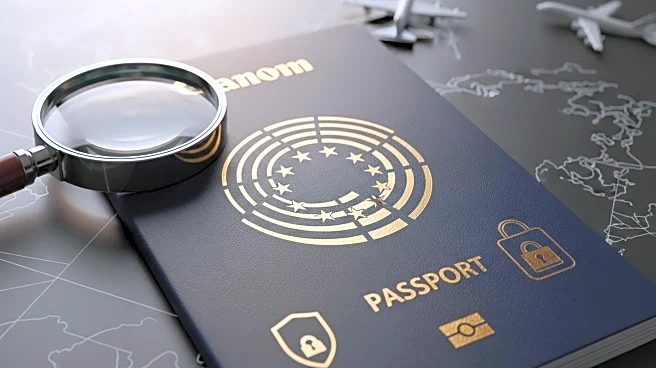What is the story about?
What's Happening?
The European Union has issued a warning to British travelers about potential scams related to the upcoming launch of the Entry/Exit System (EES) and the European Travel Information and Authorisation System (ETIAS). The EES, set to launch on October 12, will require passengers from non-EU countries to scan their passports at self-service kiosks and register biometric data. This system will apply to 30 European countries, including all EU states except Ireland, plus Iceland, Norway, Liechtenstein, and Switzerland. Meanwhile, the ETIAS, scheduled for launch in late 2026, will require travelers from visa-exempt non-EU countries, such as the UK, to obtain travel authorization before visiting the Schengen Area. The Association of British Travel Agents (ABTA) and the EU have warned of scams exploiting confusion over these new rules, with over 60 fake websites claiming to sell the ETIAS visa waiver.
Why It's Important?
The introduction of the EES and ETIAS represents a significant change in travel regulations for British citizens and other non-EU travelers. These systems aim to enhance border security and streamline entry processes, but the transition has led to confusion and potential fraud risks. Travelers may fall victim to scams, losing money and personal data to fraudulent websites. The EU and ABTA emphasize the importance of using only official channels for obtaining travel authorization to avoid these risks. The changes could impact travel plans and increase administrative burdens for travelers, highlighting the need for clear communication and guidance from authorities.
What's Next?
As the EES launches, travelers will need to adapt to new procedures at European borders, including biometric data registration. The ETIAS will become mandatory in 2027, following a transitional grace period. Travelers should remain vigilant against scams and ensure they use the official ETIAS website for applications. The EU and ABTA will likely continue to monitor the situation and provide updates to help travelers navigate the new systems. Authorities may also implement additional measures to protect travelers from fraud and ensure a smooth transition to the new regulations.















